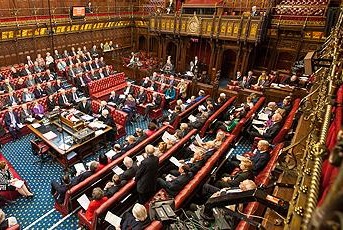Report says data used to calculate net migration is inaccurate
In a report on Brexit and the labour market published today, the House of Lords Economic Affairs Committee has strongly criticised the UK's current method of calculating net migration.
 Image credit: UK GovernmentYou can read the 58-page report here.
Image credit: UK GovernmentYou can read the 58-page report here.
As the report notes, the migration statistics are currently calculated using the International Passenger Survey, whereby data is collected by Office for National Statistics (ONS) officials who interview a random sample of passengers at 19 major and regional airports, eight ports and the Channel Tunnel rail link.
The Lords Economic Affairs Committee says in its report: "The available data on migration are extremely poor. They fail to provide an accurate number of migrants entering or leaving the country or the number of migrants in work. The data, based upon flawed sample surveys, are wholly inadequate for policy making and measuring the success or otherwise of the policies adopted. The margin of error for the latest net migration statistics was 41,000. The Government must prioritise plans to improve the longstanding flaws in the data if it is to take effective control of migration."
The Committee concluded that the International Passenger Survey is unable to bear the burden placed upon it and cannot be relied upon to provide accurate estimates of net migration.
The report added: "The difficulties with the immigration statistics will become more acute as the Government seeks to develop and assess the impact of new immigration policies. Without greatly improved statistics the Government will be formulating policy in the dark. The Government must work urgently to improve the reliability of the data. The Government must also continue to monitor the stock and distribution of migrants to ensure adequate public service provision."
In order to address the problem with the migration data the Committee recommends the Government should:
- Use information relating to the economic activity of immigrants – such as paying tax or receiving benefits – to gain a clearer understanding of how long migrants stay in the UK.
- Explore how information from exit checks, which have been reintroduced, can be combined with other information. This should help to address the unreliability of the International Passenger Survey.
- Devise a better way of accounting for the departure of international students. The current approach cannot calculate, with any precision, how many students stay at the end of their degree.
Lord Forsyth of Drumlean, chairman of the Economic Affairs Committee, said:
"The Government must have reliable statistics on migration before it formulates new policy, otherwise it will be making crucial decisions - of vital importance to the country's businesses - in the dark.
"It will take companies time to adapt their business models to be less dependent on EU workers and an implementation period is essential to ensure a smooth transition.
"Businesses will have to accept that immigration from the European Union is going to reduce and adapt accordingly. Some firms will need to raise wages to attract domestic workers. In other sectors, where migrant workers may not easily be replaced by domestic workers, firms will need to change their business models or increase capital investment in automated processes. All these options may lead to higher prices for consumers.
"The Committee's 2008 report on immigration warned that the employment of migrant workers could lead to businesses neglecting skills and training for British workers. As the recruitment and retention problem in the nursing sector highlights, these fears have been realised and training for the domestic workforce needs urgently to be given a higher priority."